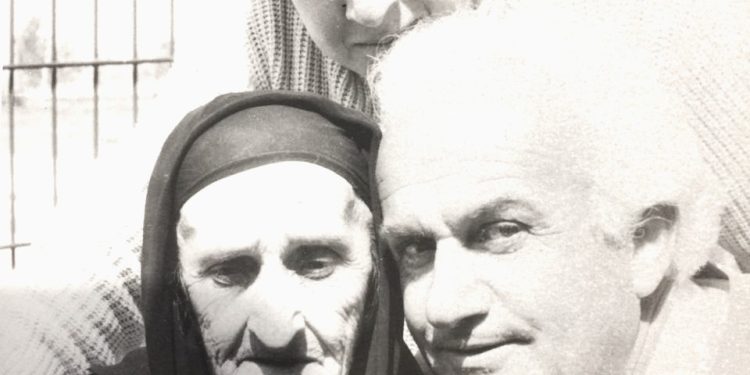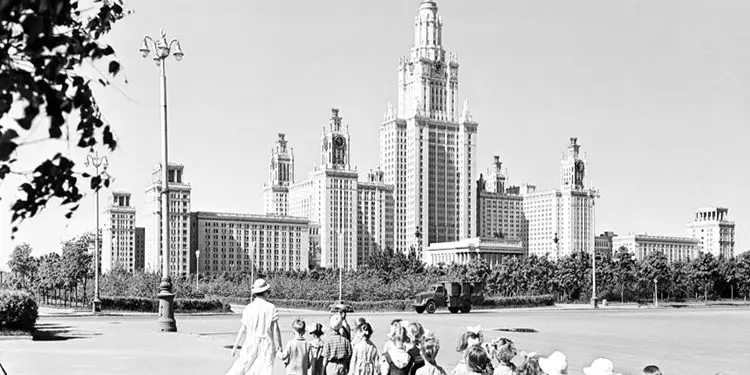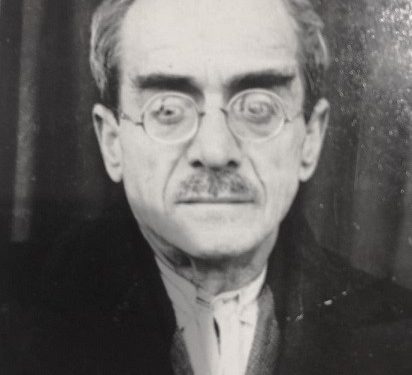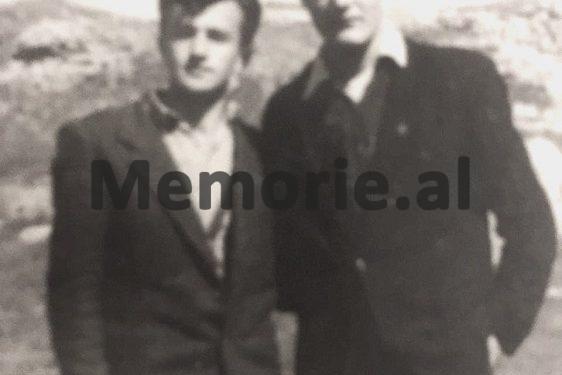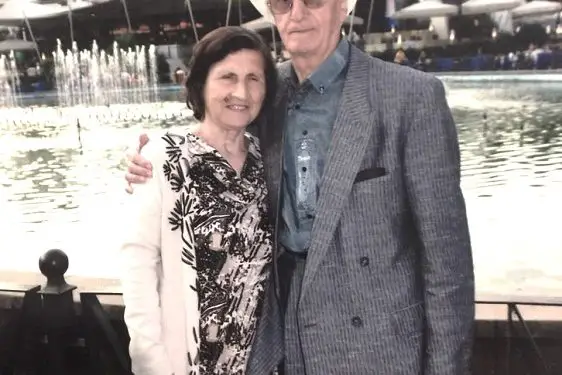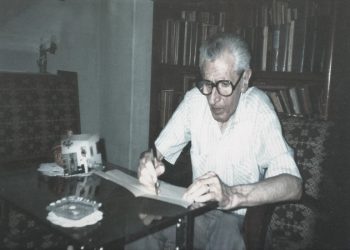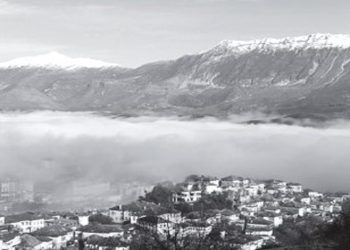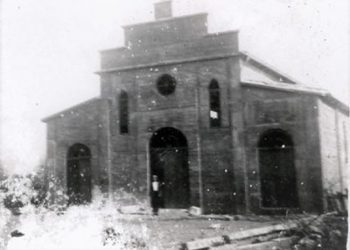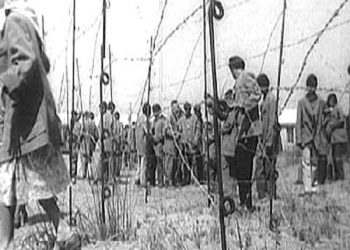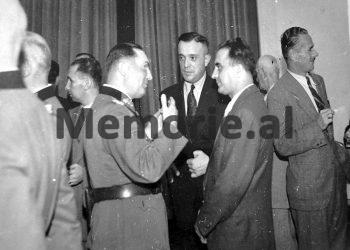From Sokrat Shyti
Part Twenty-Nine
Memorie.al / The writer Sokrat Shyti is the ‘great unknown’ who, for several years, has shown the tip of the iceberg of his literary creation. I say this based on the limited number of his published books in recent years, particularly the voluminous novel ‘Ghostly Night’ (Tirana 2014). The novels: ‘BEYOND MYSTERY’, ‘BETWEEN TEMPTATION AND WHIRLPOOL’, ‘DIGGING OF NIGHTMARES’, ‘SHADOW OF SHAME AND DEATH’, ‘COLONEL KRYEDHJAK’, ‘BURDENED HOPES’, ‘THE DISTORTIONS OF DESTINY’ I, II, ‘SURVIVAL IN THE COW SHED’, along with other works, all novels ranging from 350 to 550 pages, remain as manuscripts waiting to be published. The dreams and initial enthusiasm of the young novelist, who returned from studies abroad filled with energy and love for art and literature, were soon cut short by the fierce edge of the communist dictatorship.
Who is Sokrat Shyti?
Having returned from studies at the State University of Moscow shortly after the interruption of Albanian-Soviet relations in 1960, Sokrat Shyti worked at Radio ‘Diapazon’ (which at that time was located on Kavaja Street), in an editorial team with his journalist friends – Vangjel Lezho and Fadil Kokomani – both of whom were later arrested and subsequently executed by the communist regime. Besides radio, 21-year-old Sokrat, if we imagine him, had passionate literary interests at that time. He wrote his first novel ‘Madam Doctor’ which was on the brink of publication, but… alas! Shortly after the arrest of his friends, to fill the cup, a brother of his, a painter, fled abroad.
Sokrat was arrested in September 1963, and in November of that year, his family (with his mother and younger sister) was interned in a place between Ardenica and Kolonje of Lushnja. For 27 consecutive years, the family lived in a straw cow shed without windows, while Sokrat was subjected to forced labor. During these 27 years, he had to report three times a day to the area’s representative. He had no right to move from the place of internment, was deprived of all kinds of documentation, etc. In these conditions, among a cow shed, he gave birth and raised his children. Precisely from this event, or rather an extremely long history of persecution, he was inspired to write the book ‘Survival in the Cow Shed’!
Agron Tufa
Continues from the previous issue
EXCERPT FROM THE BOOK, ‘SURVIVAL IN THE COW SHED'”
– “In most cases, narrow-mindedness goes hand in hand with spiritual depravity, and together they form the symbiosis of evil. However, there are also cases where the symbiosis is formed from two extreme opposites, when in the same organism there coexist a fertile mind and a hellish spirit—a terribly frightening alliance that occasionally causes cyclones! Woe to those who happen to be caught in these whirlpools!
Because there are instances when human natures present themselves as a shocking variety; so wise yet so perverse, and the danger they carry causes profound dramas, even tragedies for individual people. It seems to me utterly inhumane and unethical that a category of creators, to whom fortune smiles upon to make a career, harbors pathological hatred towards the rest of the talented individuals, who in order to showcase their abilities, are forced to submit first to the whims of the elite. This alarming phenomenon also appears in politics.
But here, the means of annihilation are more abundant and feasible than in other fields, therefore, heads roll more often. You had the misfortune of being struck by the tsunami in the blossoming age. Anyone who gets caught up in such conditions makes efforts to ensure survival. Fortunately, you have a unique natural tool that will serve as a means of livelihood for a long time: you are among the very few literary creators who master the exact sciences: mathematics, chemistry, and physics.
In our time, the need for these disciplines is continuously increasing, as the spread of secondary education is taking priority. Soon, agricultural and general secondary schools will be opened in the centers of united cooperatives, as well as in major villages. However, the rate of spread significantly outpaces the number of teachers in the exact sciences. It will take years to fill this gap with the appropriate staff.
It is precisely the urgent and pressing demand for teachers of mathematics, physics, and chemistry that serves as the primary support for breaking the taboo of class struggle, allowing Sokrat Shyti, a former journalist, now ‘declassed,’ to work as a teacher! However strange this decision may sound, to me it seemed the most reasonable, and I took it according to the authority granted to me by the high duty, without gathering the Bureau of the district.
When I informed the head of the Education Section of my decision, he surprisingly expressed enthusiasm and emphasized that he knew Sokrat well from the high school in Shkodra, because when I was appointed as a teacher there, he was an outstanding graduate. I extended further with the second report to explain how our innate ability, once unwanted, has come to our aid, against which efforts have been made to avoid.”
“I am aware, according to the account of our former ambassador in Moscow, that you had an inclination for the exact sciences, alongside your natural ability for artistic activities. The former ambassador shared a secret with me: you had a proposal from the leaders of ‘Lomonosov’ University to continue your studies there, with the prospect of becoming a scholar, when diplomatic and state relations with the Soviet Union were interrupted.
But you did not accept, as a strong sense of family and patriotism drew you back to our country, a trait that honors you today. After enduring inhumane treatment in the cow shed for three consecutive years, employment in education will elevate your moral standing and the dignity of your family and will integrate you into the group of village intellectuals. Meanwhile, it will serve as a great help in coping with economic needs with the basic salary, keeping in mind that after a while, your spouse will work in the same sector.
In the Decision of the Government Commission, another detail caught my eye that disappointed me: the absence of a specified time for your sentence! It was as if it were written: eternal internment or exile! Thus explained two members of the commission when I asked them.
— “So, there’s no way for me to return to Tirana”?… I asked in a trembling voice.
— “In my opinion, there is a mysterious connection between the unwritten part of the decision, your transfer to the cow shed, and the lack of specification regarding the length of the sentence. Both these facts lead to the logical conclusion that the hope for your return will remain only in imagination, as a desire. Because even if a significant official, a friend to you, were to emerge by chance, willing to handle the documents to bring you back to Tirana, our laws wouldn’t permit it, for without the approval of the district, no movement takes place, and from my successors, you will receive no support.
What I mean is that, as time passes, you will become a local resident with your family. From me, you will only enjoy the right to work in education. But this ‘benevolence’ will come with a permanent pain: you will have no opportunity to write due to the weekly overload, which can go up to 60 hours—three times the norm, 6 hours in the morning and 4 hours in the afternoon!
You will have 10 preparations, one for each subject, as the secondary schools are small, have no parallel classes, and you will have to teach all exact disciplines, including the foreign language, Russian! You will need to write at least 30 diary pages a day, 3 pages for each subject! And these are not simple phrases and sentences, but problems, exercises, and difficult reasoning.
In addition, you will constantly be under the stringent and quite harsh pressure from the grassroots organization, primarily for the ideological axis, as their scientific understanding is completely mediocre. Naturally, you will always be at risk of traps and intrigues. Therefore, do everything possible to win the sympathy of the main local power leaders. They are the main transmitters of the Party’s line at the grassroots level, and their word carries weight.
I mentioned all these details so that you keep them in mind and become aware that the “privilege” of working in education comes with a very high cost: you will receive only one salary while facing three times the weekly norm! And even more importantly for a writer: this overloaded work will deprive you of the passion for writing because you will lack the time, and mental exhaustion will drain you.”
“But without another option for resolution, since even this one being offered is regarded as an extraordinary privilege, you are compelled to accept it to ensure your own and your family’s survival. Certainly, I am not satisfied with myself for the solution found. I understand and feel what it means for a writer to be deprived of the opportunity to write; it is like diminishing the oxygen in the air they breathe. And despite the fact that some bureaucratic leaders in our circle consider my decision for you quite bold, calling it a ‘softening of class struggle’ (being thus puts my career at risk), I am still dissatisfied.
If I could find a more practical solution that draws from your brain with little energy and gives you time to dedicate to literature, I would be willing to take on an even greater risk.”
I was left stunned by the grandeur of this extraordinary promise. Even though I heard it with my own ears, it felt as if this commitment came from celestial heights, like an echo of the pure human spirit spreading through space to uplift the hearts of the desperate! Had someone told me that the first secretary of the Party Committee in district X welcomed me warmly in his office, listened to me attentively, and then ultimately gave me hope for resolving the issue, it would have sounded to me like a fantastical tale or a deliberate fabrication disseminated under the drive of propaganda.
(Maybe some readers of this book might feel the same disbelief or doubt, questioning themselves: have there been in our country communist leaders with such liberal visions, who deeply feel the tragic spirit of an innocent, who engage the inner human impulse illuminated by a rainbow?!
Considering that in the literature of Socialist Realism, characters are presented divided into two categories: the positives, adorned with extraordinary virtues, ready for any sacrifice and selflessness, placing the common good above all else, guided in every thought and action by the enlightening ideology of the Party! While the negatives are described as the spawn of the Devil, with a thousand and one sins, without faith or shame, driven by depravity, with ropes and nooses!
Amid these, there thrive the spineless sycophants, who are sometimes used as blind tools by demons, falling prey to deception while committing sins without realizing their actions. Only when they awaken from the explanations of the communist propagandists do they repent, acknowledging that they have shown weakness and have failed to withstand the temptation of bribery.
This literature lacks the intellectuals torn between dual beliefs differing from the ideology of the ruling Party, as in its early phases they were drawn in by the illuminated part of the Moon, only to later feel extremely disappointed when caught in the trap, enveloped in the darkness of deception!”
“And to cleanse a part of the conscience caught in a snare, when given a real opportunity, they perform certain human actions with the uninfected strength of the spirit, which contradict the fundamental ‘principles’ of the darker side, making bold decisions that seem unbelievable, as readers only see people and events in black and white.
But a dignified writer with a backbone is not allowed to distort facts and events because they do not accept a preconceived worldview. Characters and people must always be described as they truly are, with all their traits, both the good and the bad. Because it is precisely the differences in traits and human characteristics that explain why astonishing turns occur in the lives of certain individuals, whose fate plunges them into the terrifying whirlpools of tsunamis and tornadoes, and it is unknown how they end: whether they are saved by protective shelters or swallowed by the abysses of black holes?
On the way back home, she did not open her mouth at all, as she continued to experience what had happened: the meeting and conversation with her mother-in-law felt like a dream! Before coming, she had imagined a quite difficult possibility, the outcome of which was uncertain. Now, however, not only was there no doubt, but she considered the conversation a surprising success, the favorable turn taken after presenting the state of the two families by mother Ana. It didn’t even occur to her, nor could she believe, that she would hear such warm understanding from her mother-in-law.
On the contrary, she feared a terrifying misunderstanding, wondering if perhaps under the pressure of some internal anger, mother Ana would launch a harsh complaint against her people, accusing them of one-sidedly examining the issue and the shared distress, when this matter simultaneously concerned both families. Additionally, she was frightened by the sudden outburst of her single sister-in-law, who would certainly feel insulted that her brother took this step without obtaining his sister’s approval, even if she did not express her opposition and formally give her consent.
From a cold judgment, even if this outburst happened, she had no right to hold a grudge against her sister-in-law, as it is known that feelings of jealousy often spring in the mind of every woman on the brink of engagement.
Especially when the bond is forged with the beloved nephew, jealousy swells to the proportions of a dazzling pearl in the depths of oceans, which are rarely bestowed upon couples. But for the sake of truth, her sister-in-law remained silent, not participating in the conversation, only listening to what her mother said. The possibility of her not having her mind on her brother’s engagement was ruled out, as she was not at all interested in this event, hence she remained dismissive.”
“Why should she interfere in a matter that does not affect her fate? Moreover, if she were asked for her opinion (about what she thinks of the girl her brother is going to be engaged to), she would give her impression. But in this specific case, it seemed completely pointless for her to say anything, knowing that the couple was madly in love, and the girl had the courage and boldness to go against her parents and relatives, accepting the toughest living conditions, considering the blemish in her background that would follow her like a shadow. Perhaps her single sister-in-law, in those moments, asked herself: would I be ready to take the same stance under such terrible conditions?
Certainly, this question would remain unanswered. Because only a girl who loves with the strength and persistence of the Arqelin can experience the fiery sensation of a volcano within her soul and consciousness. Dhora accepted the contrary, that during these last three years, she had experienced a spiritual impoverishment: instead of the vibrant feeling, she created for herself a noisy void and a barren emptiness that would never green again! Her fate had been twisted from the very beginning, and it would continue to drag her down. No one can change the course of this twisted fate!
— “Here we are at our meeting place…” — I said, as we stopped at the garden in front of her house.
— “Since today is different from other days, I immediately agreed to meet your mother and sister, why don’t you try too, when a step separates us from the door?” — she asked, looking me straight in the eye.
— “Are you sure they will accept me?” — I replied.
— “Between the lover and the fiancé, parents always choose the latter, as the fiancé separates the girl from marriage by one step,” — she said in a pleading tone. — “Therefore, it makes no sense to leave now without meeting my mother!”
— “Agreed, I will follow your example!” — I promised her.
— “Go ahead!”
As soon as we stepped through the wooden gate and found ourselves in the courtyard shaded by mandarins and lemons, we heard from the veranda the reproving voice of mother Ulë:
— “Had you delayed even a little, whispering to each other, I would have called you from here!”
— “I am the guilty one…” — I replied as I climbed the stairs to kiss her hand. — “I hesitated for a moment to ask myself…”
— “You should have asked yourself before getting into this dangerous venture, not today when all of Lushnja knows!” — mother Ulë admonished us both.”
– “Well, we didn’t ask and we did very well!” — I replied with a smile. — “The merit for our affairs going smoothly, despite initial troubles, belongs to your daughter, who diligently faced a raging river of opposition.”
– “Now that you succeeded, you seem to have found your voice…?!”
– “You should be happy that our bond was crowned successfully,” — I interrupted. — “My mother, for instance.”
– “So you’re coming from there?!…” — asked mother Ulë, quite surprised and concerned. — “You both were in Kolonje?!”
– “Not in Kolonje, but at my older sister’s house,” — I clarified. — “Since my mother is here and the place where we rehearse is just a step away from Stavri’s house, we paid a visit. Because it seemed completely pointless not to meet the parents when soon we will be going out together as engaged.”
– “So, you have even managed to skip the engagement time?!” — added mother Ulë with an unsatisfied tone.
– “Mothers’ minds are much deeper than ours. At first, you point out our flaws, chastise us for the mistakes made, tell us how we should proceed without rushing, and teach us what we ought to keep in mind.”
– “You have a sharp tongue!” — said mother Ulë. — “That’s why you spoil my girl’s mind…?!”
– “You might not believe it, but our love, dear mother of Lika, was born in silence, without words, through glances, without grand promises and mutual expressions. As such, it can be called one of the rarest and most special loves. You should be convinced of this. At first, we exchanged our thoughts only through looks. We both showed maturity and care, knowing that we were separated by insurmountable obstacles and rushing rivers, so we did not dare to express our feelings to each other.”/Memorie.al
Continues in the next issue.
Copyright©“Memorie.al”
All rights to this material are exclusively and irrevocably owned by “Memorie.al”, in accordance with Law No. 35/2016 “On Author’s Rights and Related Rights”. It is strictly prohibited to copy, publish, distribute, or transfer this material without the authorization of “Memorie.al”; otherwise, any violator will be held liable under Article 179 of Law 35/2016.





